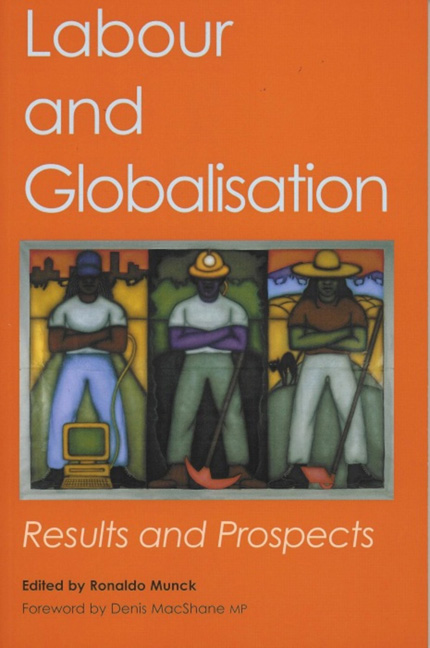Book contents
- Frontmatter
- Contents
- Acknowledgements
- Foreword
- Notes on the Contributors
- List of Abbreviations
- Introduction: Globalisation and Labour Transnationalism
- Part I Global Dimensions
- Part II Spatial Dimensions
- Part III Social Dimensions
- 9 Beyond Unions: Labour and Codes of Conduct
- 10 Globalisation and Child Labour: Protection, Liberation or Anti-Capitalism?
- 11 Globalisation, Trade Unionism and Solidarity: Further Reflections on the Liverpool Dock Lockout
- 12 Globalisation and Trade Union Strategy: Evidence from the International Civil Aviation Industry
- Index
12 - Globalisation and Trade Union Strategy: Evidence from the International Civil Aviation Industry
from Part III - Social Dimensions
- Frontmatter
- Contents
- Acknowledgements
- Foreword
- Notes on the Contributors
- List of Abbreviations
- Introduction: Globalisation and Labour Transnationalism
- Part I Global Dimensions
- Part II Spatial Dimensions
- Part III Social Dimensions
- 9 Beyond Unions: Labour and Codes of Conduct
- 10 Globalisation and Child Labour: Protection, Liberation or Anti-Capitalism?
- 11 Globalisation, Trade Unionism and Solidarity: Further Reflections on the Liverpool Dock Lockout
- 12 Globalisation and Trade Union Strategy: Evidence from the International Civil Aviation Industry
- Index
Summary
For trade unions, the central problematic of globalisation is widely seen to be a growing disparity between the mobility of capital and that of labour. The ability of capital to operate on a transnational basis is judged to provide employers with a lever by which they can extract industrial relations concessions from labour (Graham, 1995; Mueller, 1996; Mueller and Purcell, 1992) and thereby pursue a ‘race to the bottom’ in relation to employees’ terms and conditions as international companies seek to cut labour costs (Brecher andCostello, 1994). This greater mobility of capital is seen to contrast with the relatively more fixed and nationally based characteristics of labour. Schmitter and Grote have summarised this approach thus:
Of course the real culprit – everyone's favorite deus ex machina – was (and still is) globalisation. Sharpened international competition … [and] the overt threat tomove to another site put great pressures on workers to make concessions … The upshot of these trends seemed quite clear to many analysts in the 1980s. At best ‘national corporatism’ had to shift from the macro to the meso level of aggregation. (Schmitter and Grote, 1997: 28–29)
The problem with such approaches, however, is that they assume that management acquires a set of power resources in its relation with labour which it translates into changes in work organisation and reductions in labour costs, without acknowledging the more dynamic features of labour responses in both global and national contexts. Further, systematic empirical evidence on the impact of globalisation is hard to find, as is any assessment of the differential impact of globalisation on different occupational groups or within different industrial sectors. Moreover, the studies that are available commonly involve manufacturing, and the automotive sector in particular, which may not adequately represent the overall dynamics of globalisation and management strategy.
Focusing on the international civil aviation industry, this chapter examines the effects of globalisation on employees and the national and international strategies developed by organised labour in response. Although the evidence points to some deterioration in terms and conditions of employment, trade unions have been able to retard the pace of change and defend effectively the interests of some occupational groups. Moreover, the future course of globalisation in this sector, as in others, will be contested through new international strategies and repertoires of collective action being developed by the trade union movement.
- Type
- Chapter
- Information
- Labour and GlobalisationResults and Prospects, pp. 227 - 244Publisher: Liverpool University PressPrint publication year: 2003



